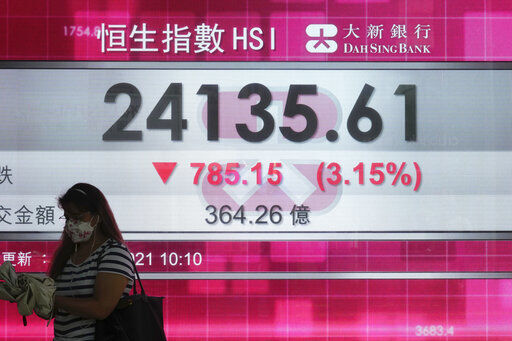Stocks slumped in morning trading on Wall Street today in a broad sell-off that extends an already weak streak for major indexes.
Worries about debt-engorged Chinese property developers — and the damage they could do to investors worldwide if they default — are rippling across markets.
The S&P 500 fell 1.5% as of 9:03 a.m. Central. The benchmark index hasn’t had a decline of more than 1% since mid-August. It’s also coming off two weeks of losses and is on track for its first monthly decline since January.
The Dow Jones Industrial Average fell 495 points, or 1.4%, to 34,086 and the Nasdaq fell 1.7%.
Technology companies led the broader market lower. Apple fell 1% and chipmaker Nvidia shed 2.7%.
Banks posted big losses as bond yields slipped. That hurts their ability to charge more lucrative interest rates on loans. The yield on the 10-year Treasury fell to 1.32% from 1.37% late Friday. Bank of America fell 3.1%.
Oil prices fell 1.3% and weighed down energy stocks.
Utilities and other sectors that are considered less risky held up better than the rest of the market.
The worries over Chinese property developers and debt recently centered on Evergrande, one of China’s biggest real estate developers, which looks like it may be unable to repay its debts.
Many analysts say they expect China’s government to prevent a blowup serious enough to cause losses to cascade through markets. But any hint of uncertainty may be enough to upset Wall Street, after the S&P 500 has glided higher in almost uninterrupted fashion since October.
“While the Evergrande situation is front and center, the reality is, stock market valuations are overstretched and the market has enjoyed too long of a break from volatility and (today’s) stock market declines are not surprising,” David Bahnsen, chief investment officer of wealth-management firm The Bahnsen Group said in a research note.
The Hang Seng, Hong Kong’s main index, dropped 3.3% for its biggest loss since July. Many other markets in Asia were closed for holidays. European markets fell about 2%.
Investors are also watching to see how the Federal Reserve reacts to bumps in the broader economic recovery. The central bank has signaled that it will eventually reduce its bond purchases, which have helped keep interest rates low. The timing of that move remains unknown.
The Fed is due to deliver its latest economic and interest rate policy update on Wednesday.
Other concerns for investors include a potentially messy political fight in Washington over the U.S. debt ceiling. House Democrats said Friday they planned to move this week to suspend the cap on the government’s borrowing authority, and the White House ratcheted up pressure on Republicans by warning state and local governments that severe cuts lie ahead if the measure fails in the Senate.


